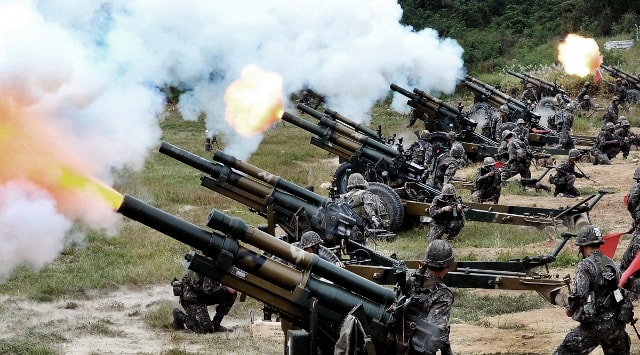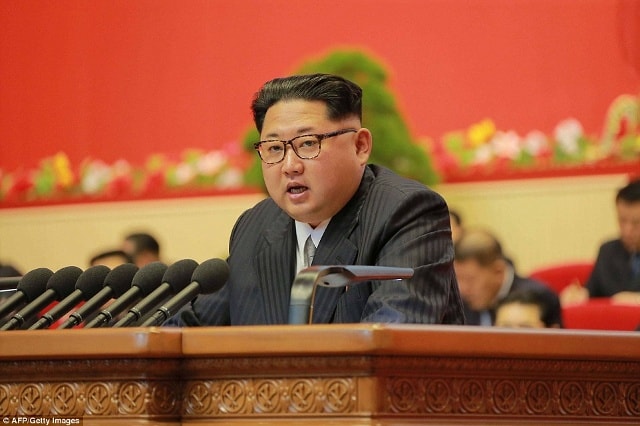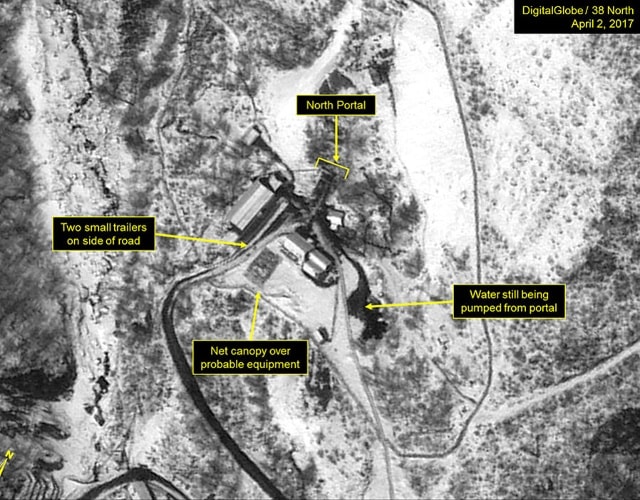North Korea will only stop nuclear testing once Kim Jong-un's government remains in power
(Baonghean.vn) – Time is running out if the US wants to prevent North Korea from gaining the ability to strike the US with nuclear weapons. Realizing this, the administration and outside advisers are coming up with a range of options to put pressure on Pyongyang.
But most of these proposals have been tried—and failed. A truly different approach is needed. If Washington wants Pyongyang to give up its nuclear weapons, it must also be willing to allow the communist government in North Korea to survive.
 |
| US-South Korea joint military exercise. Photo: AP |
The cost would be high, but the alternatives are worse. North Korea has tested five nuclear weapons, and on July 4 it tested a missile with a yield of at least 5,500 kilometers (3,400 miles) that was confirmed to be an intercontinental ballistic missile (ICBM). There is little reason to doubt that sooner or later North Korea will overcome the current technological hurdles to its goal: the ability to reach a major US city with a nuclear weapon small enough to be carried on a missile but rugged enough to survive the rigors of re-entry into the Earth’s atmosphere.
Previous US efforts to prevent North Korea from following this path, such as limiting economic aid, multilateral negotiations, cyberattacks, and relying on Chinese pressure, have not really had any effect on Pyongyang’s overwhelming ambition to possess such capabilities. North Korea has made great strides in its ballistic missile and nuclear development programs in recent years. For decades, the US’s “carrot and stick” approach has failed to recognize that for North Korean leaders, the ability to strike the US with nuclear weapons is the ultimate security guarantee against US attempts to overthrow the country.
Other means of persuading North Korea to abandon its ICBM ambitions also seem unlikely. A preemptive strike to destroy North Korea’s nuclear and missile capabilities would certainly be on the list. The United States certainly does not have the full location of its weapons facilities, many of which are buried underground, where they would be difficult to destroy. Even if the entire facility could be destroyed, the knowledge of the weapons would remain in the minds of North Korean scientists and engineers. It would only be a matter of time before North Korea could restore its nuclear capabilities.
More importantly, the immediate consequences would be devastating for the people of South Korea and possibly Japan. The vast Seoul metropolitan area, with its 25 million people, would be within range of hundreds of artillery and missile launchers from neighboring North Korea. Hundreds of North Korean ballistic missiles could reach other parts of South Korea, or Japan if Pyongyang chose. In addition to killing thousands, these attacks could trigger a humanitarian crisis of unprecedented scale.
 |
| North Korean leader Kim Jong-un says his country will not use nuclear weapons unless hostile forces use them first |
Economic sanctions are also unlikely. Economic sanctions imposed by the United Nations and the United States have had little effect. The only country with significant economic ties to North Korea is China. Despite its stated desire to see a denuclearized North Korea, Beijing has so far applied only modest economic pressure on Pyongyang. This is because China appreciates North Korea’s nuclear drive and alludes to its own self-interest.
Nuclear weapons have little military value for North Korea. Any nuclear attack on the United States or its allies would result in the destruction of the North Korean state. However, the nuclear threat has great political value as a deterrent. The US-South Korea alliance could invade North Korea and overthrow the regime—as the US did in Iraq in 2003—if the alliance was willing to accept the loss of life and property. Faced with certain death, North Korea’s rulers would be determined to launch a nuclear attack if invaded. So does Washington threaten the survival of the Pyongyang regime?
Chinese leaders believe that, for this reason, the Pyongyang regime is not willing to give up its ambitions to develop nuclear weapons and is ready to respond to the United States, no matter what pressure it is subjected to.
Furthermore, the collapse or overthrow of the North Korean regime would result in the country being “swallowed up” by its southern neighbor, much like East Germany was annexed by West Germany. South Korea’s takeover of the entire Korean peninsula would create a democratic and US-allied state right on China’s doorstep. It is therefore conceivable that China would rather see North Korea possess nuclear weapons than see it collapse.
 |
| Operations continue at the North Gate. Photo: Getty |
A new solution to the current crisis, then, may be to use North Korea’s nuclear weapons as a bargaining chip for survival. There is no denying that ensuring the survival of Kim Jong-un’s regime is both difficult and unpleasant. However, the Pyongyang regime has long sought a peace treaty with the United States. The United States views such a treaty as largely symbolic, since an armistice has held on the Korean Peninsula for more than 60 years.
For North Korea, however, a peace treaty would represent formal US recognition of Pyongyang’s rights as an independent state. And if the US confirms to China that it will allow North Korea to exist indefinitely, then North Korea’s rulers will be satisfied that the US can no longer threaten their survival.
Of course, these regimes would rather have nuclear weapons than a treaty to back them up. That’s why they will face economic sanctions if they don’t give up their nuclear weapons—which only China can impose. And to pressure China into doing so, the US has threatened to impose so-called “secondary sanctions” on Chinese entities doing business with North Korea if Beijing doesn’t put more pressure on Pyongyang.
Another country whose interests must be considered: South Korea. The Seoul government understands that a sudden “swallowing” of North Korea would be much more costly and painful than reunification in Germany.
The benefit for South Korea is, first, that North Korea will reform and open its economy for several decades before unification with South Korea. In particular, with the assurance that the US and South Korea will not overthrow them, the North Korean rulers will have enough security confidence to allow further economic reform.
While it is difficult to predict the consequences of a pact between Beijing and Pyongyang that allowed the North Korean regime to survive indefinitely, the security benefits for the United States and its allies would be immediately clear: North Korea’s nuclear and long-range missile programs would be completely stopped.
There is no guarantee that the approach outlined in this article will be successful, but it is clear that all other approaches taken so far have failed. It is time to try something new./.
Lan Ha
(According to National Interest)
| RELATED NEWS |
|---|
